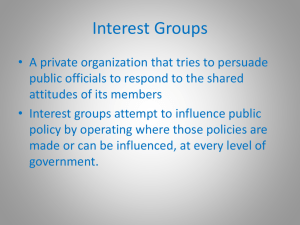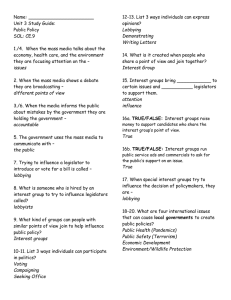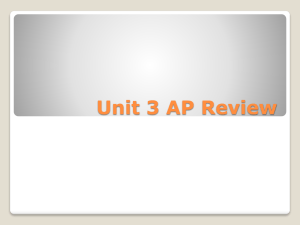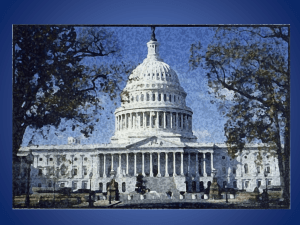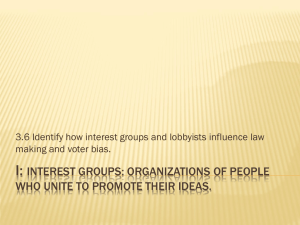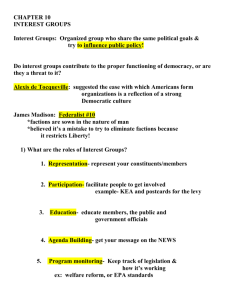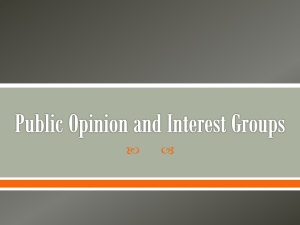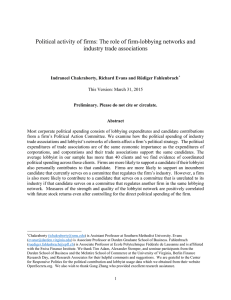Interest Groups, PACs, and Lobbyists
advertisement
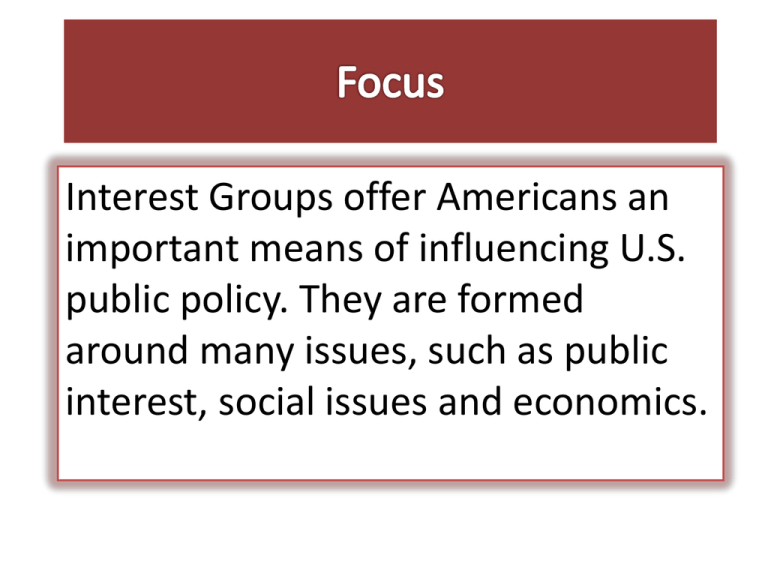
Interest Groups offer Americans an important means of influencing U.S. public policy. They are formed around many issues, such as public interest, social issues and economics. Who do Interest Groups Influence? Federal level Influences public policy goals State level Interest Group Influences actions taken by political leaders Local level What is the difference between Interest Groups and Political Parties? Political Parties • Care mostly about who takes part in government Interest Groups • Care mostly about what the government does – especially on select issues Pros Cons Stimulate interest in public affairs and issues that concern the people at large Critics say they have more influence than they deserve based on the worth of their causes or the number of people they represent Offer a chance for people to participate in politics and connect with others who share their views Difficult to tell exactly how many people an interest group represents Provide useful information to the government leaders who may not be familiar with all the issues Some interest groups do not represent the views of all the people they claim to represent Since they compete with each other, they limit extremes Interest groups can draw too much attention to an issue with aggressive behavior, thus causing politicians to cater to special interests Keeps close tabs on government What are the different types of Interest Groups? Many Americans belong to several organizations that meet the definition of an interest group Trade Associations Interest groups formed by one segment of the business community. Ex. Banking Industry Labor Unions Political Economic and Social Cause Groups Religious Interest Groups Public Interest Groups Work for the Interest groups “public good” – whose members try to represent are workers who Promote groups Promote certain religious interests all the people in hold similar jobs like veterans, the country on or work in the taxpayers, elderly, like Right to Life, issues that affect Jewish same industry. protection of the Defamation us all like voting Ex. Police environment League rights, consumer Officers, Teachers rights, fresh water Purpose Example Promote business American Bankers Association Organize Labor Fraternal Order of Police Promote professions American Medical Association Promote social programs Veterans of Foreign Wars For the public good League of Women Voters How do Interest Groups Work? Propaganda The technique of persuasion aimed at influencing behaviors to create certain beliefs These beliefs may be true, false or partly true Use of Propaganda • Goal is to create a particular belief. • Begins with a conclusion and uses information to support the conclusion. • Ignores information to disprove conclusion. • Often attacks other beliefs through name-calling or by discrediting other viewpoints by presenting only one side of the argument (card-stacking) • Mud Slinging – making other candidate look bad • Uses symbols and labels to produce results – “American”, “fair”, “just” – Testimonials – TV stars and athletes Do Now The Constitution guarantees people the right to peaceably assemble, and to petition the government for the redress of grievances. That is the basic goal of interest groups – to address the government for what they perceive as grievances. Can you think of an interest group TODAY that is assembling to address the government for what they believe is wrong? How do Interest Groups Impact Political Parties? What are PAC’s? PAC’S Single Interest Groups that concentrate their efforts on one issue They work for or against a candidate based only on his or her stand on that one issue What do PACS do? • Raise money from special interest constituents and donate hard and soft money to political parties and candidates. What do Lobbyists do? • Lobbyists provide interest groups with specialists to advance their causes and influence policy making • Lobbying is a protected activity under the U.S. Constitution that guarantees rights to free speech, assembly, and petition to government. Lobbying is a regulated industry Direct Methods: • Personal contact with legislators most effective • Providing expertise to legislators or other government official • Offer “expert” testimony before congressional committees for or against proposed legislation • Assisting legislators or bureaucrats in drafting legislation • Follow up: legislation carried out • Election Support – – – – – Can take part in the political parties campaign Members can run for office Urge members to vote for candidate Threaten withdrawal of their votes Provide money through PAC’s Indirect Methods: • Using public opinion. If the public favors a group’s ideas, a legislator is more likely to listen • Mobilizing constituents; write letters or make calls to show support of opposition • Brining lawsuits • Influencing Judicial Appointments • Staging Demonstrations Regulations • 1946: Federal Regulation of Lobbying Act – lobbyists must register with the House and Senate • Lobbying Disclosure Act of 1995: all individuals who seek influence any member of Congress must disclose basic personal information about themselves, their lobbying activities, and their clients. • States also regulate the activities of lobbyists How are Interest Groups different from Public Opinion? • • • • • Interest groups are policy specialists Focus on only a handful of key policies More tightly organized Financed through dues and contributions Try to influence the outcome of elections, but do not compete for public office What did we learn? • • • • • • • • • • • Interest groups represent the many “publics” in society They DON’T nominate candidates like parties They DO influence officeholders They can be economic, occupational, environmental, public good and minority issues Lobbyists and PAC’S are the most criticized part of political process A lot of money is spent on getting attention to the issues these groups represent. Interest groups have aroused suspicion as factions since the beginning of this country They do whatever they can to influence candidates for their group PAC’S raise money to help influence issues Lobbyists provide interest groups with specialists to advance their causes and influence policy making Soft Money can provide candidates with a lot of money because it is often overlooked – recent regulation limits the amount of soft money allowed. Open Secrets.org • OpenSecrets.org is your nonpartisan guide to money’s influence on U.S. elections and public policy. Whether you’re a voter, journalist, activist, student or interested citizen, use our free site to shine light on your government. Count cash and make change.
